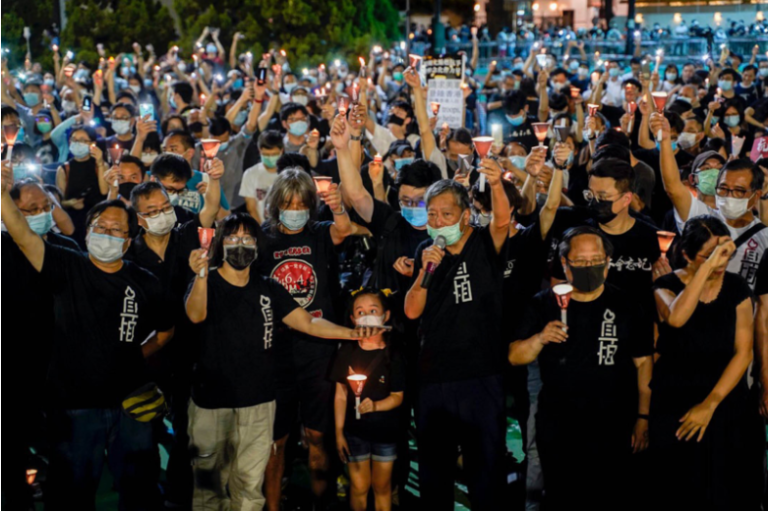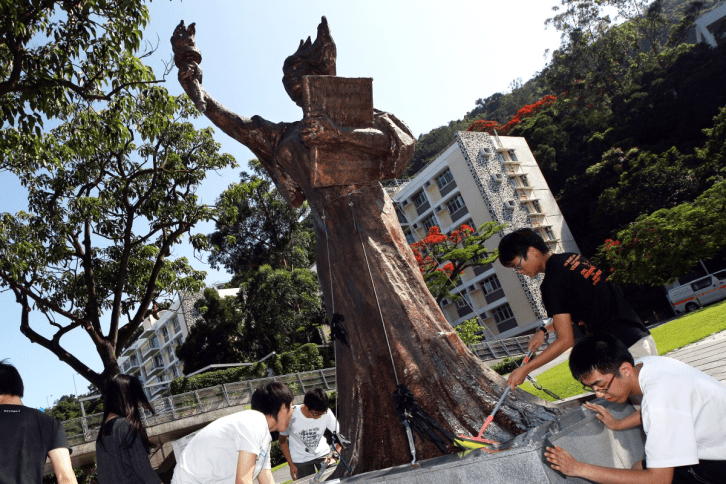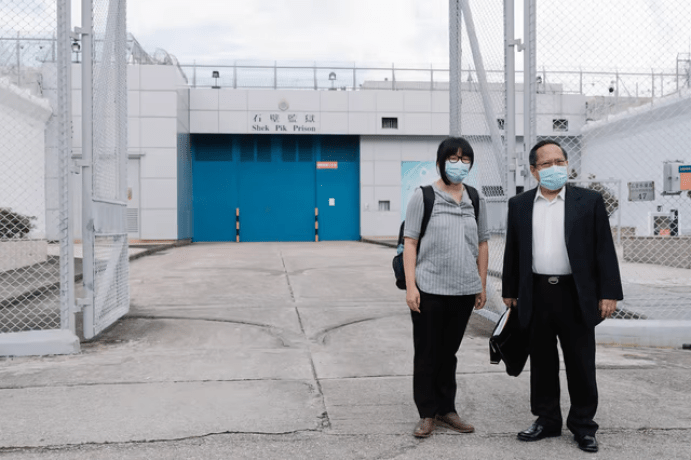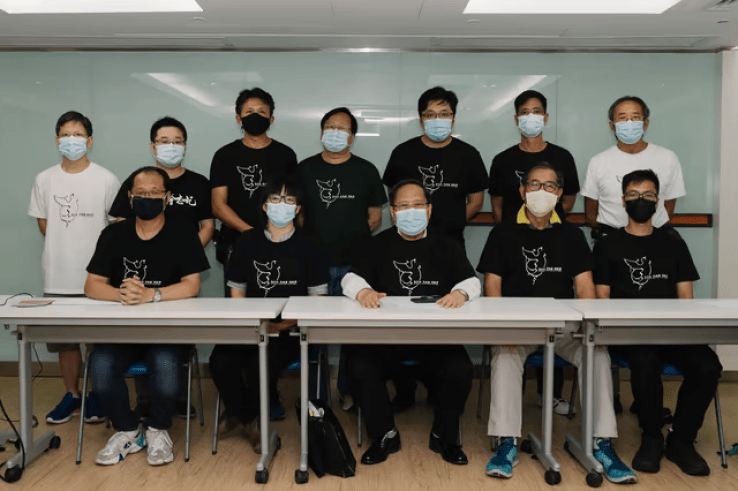The Life and Death of the ‘Hong Kong Alliance in Support of Patriotic Democratic Movements of China’ – Part Six
The Life and Death of the ‘Hong Kong Alliance in Support of Patriotic Democratic Movements of China’ – Part Six
By Olivia Cheng, Siaw Hew Wah, translated by China Change, August 18, 2022

(Continued from Part One, Part Two, Part Three, Part Four, and Part Five)
Continuing crackdown pre- and post-’97
In the years after 1989, the situation for the Hong Kong Alliance was relatively uneventful. But with the approach of 1997, the storm picked up again.
Lo Wai-ming (盧偉明), who was the president of the CUHK Student Union in 1996, recalled that every May and June, the student union would participate in the Alliance’s joint signature drive (as part of offering respects for the dead at Tiananmen), but that year’s discussion was particularly intense:
“Many of the students were concerned. There were questions like ‘[you say] hold those who massacred the city [of Beijing] accountable, did they kill everyone in Beijing? Is it alright to use such words? Will I be able to find a job if I take part? If I apply for civil service, will they put me on a blacklist?’” As a result, the CUHK Student Union declined to participate in that year’s joint signature event.
Albert Ho (何俊仁) remembers that when he was asked about whether the Alliance would be able to successfully transition in 1997, he only felt that there was a moral responsibility to continue, and that the Alliance would take risks if it had to.
Richard Tsoi (蔡耀昌) also recalls the appeals the Alliance made to the Hong Kong people — if the Alliance was banned after 1997 and unable organize its usual vigil to commemorate Tiananmen, the city’s people should go to Victoria Park and light candles of their own volition.
On the eve of the transfer of sovereignty in 1997, the authorities created obstacles for the Alliance. At that time, the Danish sculptor Jens Galschiøt made the “Pillar of Shame,” which stands about seven meters in height, for the eighth anniversary of the June 4th massacre. At first, the Municipal Council rejected the application, and the Pillar was not allowed to be placed at the Victoria Park soccer fields on the anniversary day, and only after an appeal did the government allow the venue to be lent out. After the evening vigil on June 4, the Pillar of Shame was transported to the University of Hong Kong, and again this placement was obstructed by the HKU authorities and the police before the statue was successfully moved into campus around 3 a.m. (on June 5).
“In the early hours of that night, I received a phone call from the school. I told them that if the students refused to leave, the university’s obstruction would only spiral into a big political incident,” Albert Ho recalled.
After 1997, then-Chief Executive Tung Chee-hwa (董建華), in an interview with the press, publicly called on the people of Hong Kong to “help strengthen the country by letting go of the burden of June 4th.” Even when he was still chief executive-elect, he met with Szeto Wah (司徒華) thrice and demanded that the mourning events be put to an end. Tung’s successor Donald Tsang (曾蔭權) made similar requests. At a 2009 LegCo meeting, when questioned as to whether he would support the rehabilitation of the Tiananmen protests, Tsang just replied, “From when this incident occurred all the way up to today, the country has seen impressive development and brought economic prosperity to Hong Kong.”
“But we disagree,” Albert Ho retorts, “because we have a moral duty to shoulder this responsibility. We should not attempt to push this national burden under the rug.”
At the end of May 2010, the Alliance exhibited the Goddess of Democracy statue in Times Square of Causeway Bay. The statue was subsequently confiscated by the police, and several standing committee members of the Alliance who were sitting on the ground defending the Goddess were also arrested; the statue was later returned. The same year, the public was full of discussion about plans for political reform. Then-Justice Secretary Leung Oisy (梁愛詩) and Deputy Director of the PRC’s Hong Kong Liaison Office Li Gang (李剛), successively attempted to lobby Albert Ho to withdraw from the Alliance. He told Stand News that he withstood their pressure, being determined to remain firm in his convictions.

In recent years, the June 4th Memorial Museum has often been harassed by people of unknown origin. “Those people came in and said that we lied to the masses and spread false information,” said Mak Hoi-wah (麥海華). “They also said that nobody was killed [at Tiananmen], asking for evidence. Also, someone called the Fire Department saying the unit where the June 4th Museum was located smelled of burning and asking the firefighters to inspect us.” Mak said that the website of the June 4th Memorial Hall was attacked by hackers on the eve of the 25th anniversary of June 4th. On June 1 this year, the Food and Environmental Hygiene Department (食環署) staff went to the June 4th Museum” to investigate, saying that the Alliance had not obtained a license for places of public entertainment and was suspected of violating the “Places of Public Entertainment Ordinance,” and ordered the museum to close on the same day.
In addition, around 1997, some members of the Alliance Standing Committee either had their Mainland Travel Permit confiscated, or were flat-out refused entry into China. For example, in August 1993, Richard Tsoi accompanied Han Dongfang (韓東方), the leader of the labor movement during the Tiananmen protests, to return to the mainland, but his travel permit was confiscated, and his two applications for another were rejected shortly thereafter. It was not until he joined the Alliance for Universal Suffrage (終極普選聯盟), which advocates communication [the governments of Hong Kong and China] , as the deputy convener, that he was reissued mainland travel permit in 2016.
In 1995, Albert Ho applied to renew his permit, but the China Travel Service (中旅社) rejected his application along with his original permit and application fee. Lee Cheuk-yan (李卓人) did not go to China after 1989, but some citizens with the same name as him were temporarily detained, denied entry, or lost their permits when trying to cross the border into mainland China.
In 2019, Chow Hang-tung (鄒幸彤), who had often traveled between Hong Kong and mainland to assist rights defense work, was also denied entry repeatedly. “At the Lok Ma Chau Control Point (落馬洲管制站), they would suddenly stop me and take me to a small room. Then they told me to turn around and go back. I tried and failed several times to ‘storm the gates,’” Chow said.

From 20 standing committee members to 14, as threats of arrests mount
Following 1997, steps by the government to ban the Alliance were far from immediate, and the “calm before the storm” lasted much longer than perhaps anyone would have imagined. Last year [2020] around June 4, the police for the first time — and citing the pandemic — banned the Alliance’s events to mourn Tiananmen. That evening, the Alliance standing committee members who entered Victoria Park were arrested and charged with inciting others to participate in an unauthorized assembly. Multiple members from the pro-democracy camp were also slapped with the same charge; several received heavy sentences. This year [2021], the police again used pandemic restrictions on large social gatherings as its pretext to ban the Alliance’s annual June 4th parade and rally.
On the 13th of last month [August 2021], shortly before his trial for “unauthorized assembly” on Oct. 1, 2019 China National Day, Albert Ho, together with Chow Hang-tung, went to Shek Pik Prison (石壁監獄) to visit Lee Cheuk-yan. While in transit, Ho said that he was buried in work. Not only did he have to prepare for his own prison time, he had to follow up with his friends’ cases, take interviews, and prepare for the Alliance’s June 4th seminar.
“The topic is the first 30 years of governance under the CCP starting 1949. There is a vast amount to cover here: the Land Reform (土地改革), the Three-anti and Five-anti Campaigns (三反五反), the Three Red Banners of the Great Leap Forward (三面紅旗大躍進), Cultural Revolution (文化大革命), the Gang of Four (四人幫). All that in 30 years. We’ll discuss the damage and impact of what happened in this period,” Ho said.
“Frankly, history seminars attract small audiences and aren’t sensitive, so I’m not worried,” Chow responded. “Because if you don’t know Chinese history, you won’t understand the CCP and even less about what’s facing Hong Kong. Now even I’m going to prison. This is the era we live in, there is not much we can do about it.”
At the end of last year [2020], the Alliance elected a new Standing Committee. Under the National Security Law, it means that the members will shoulder the greatest political risks the Alliance has ever seen.
After months of discussions and assessing the situation, the Alliance members decided to streamline the organizational structure and reduce the number of standing committee members from 20 to 15. Lo Wai-ming said that at the meeting, some people proposed to reduce the number to 3 or 7. Mak Hoi-wah had the impression that someone proposed a reduction to 11 members, but this idea was scrapped because it would cause a loss of confidence from the public when the committee is reduced to half of its size. He added that the reason for reducing the size of the committee was that one, the organization no longer needed so many people on the team, and second, due to considerations of risk. “We are psychologically prepared for the fact that the Alliance will come under fire or be banned,” Mak said.
But during the election of Standing Committee members, only 14 were elected, and eight of them faced charges related to the 2020 June 4th assembly. In the one-hour consultative meeting, the representatives from various groups of the Alliance were visibly apprehensive as they discussed how to respond to the National Security Law and expressed concerns for the Standing Committee members’ safety as well as the future of the Alliance.
Of those who decided to stay with the Alliance, each has a different reason.
Ho, who received two concurrent jail sentences of 18 months in prison for the Aug.18, 2019 protest and the Oct.1, 2019 assembly shortly after our interview, believes it’s a matter of moral responsibility. He said that he is already getting on in years and it matters little whether he goes to prison or not. “I want to see with my own eyes how society changes. A lot of people who grew up with me also won’t leave. Over the past 30 years those of us who still commemorate June 4 have quietly scattered to different places. If you want to send me to prison, I won’t consider it a shame, it’s the people who imprisoned us who should feel ashamed. The world is watching, what a farce this is.”
Richard Tsoi, who received a suspended sentence over the Oct. 1 assembly case and is currently free, but still faces trial for taking part in the June 4th gathering, said: “We call ourselves the 1989 generation. The Alliance needs to keep going, and for me, there’s no shirking this responsibility.”
With chairman Lee Cheuk-yan and vice-chair Albert Ho in prison, Chow Hang-tung has stepped forward. She feels that the civil society in Hong Kong still has a good foundation and people are still united, they won’t be silenced immediately. This made her determined to try even harder. Because of her human rights work, she has seen the suffering of [the mainland] human rights activists and already prepared herself for what’s to come.
“Liu Xiaobo once said that for pro-democracy activists to serve prison sentences is the same as farmers tilling their land and workers going to the factories,” she said. Facing trial over the June 4th gathering, Chow has prepared herself for her prison sentence. She expects to continue the Alliance’s organizational work at the Alliance as she alternates between freedom and incarceration.
Lo Wai-ming, another standing committee member who has stepped forward under the current climate, described himself as a prudent and thoughtful person. In 2002, he had opposed the Public Order Ordinance (《公安條例》) through civil disobedience and was bound over for three months. This time, he said: “Since young, I always heard Uncle [Szeto] Wah say that ‘victory belongs to those who persist to the end.’ I hope that there’s still a chance for me to do something for the June 4th pro-democracy movement.”
Mak Hoi-wah’s only hope is that before his sentencing on June 11 [2021] over the June 4th gathering, he could finish curating content for the digital June 4th Museum and leave a historical record for the future.
After the anti-extradition movement, district councilor Leung Kam-wai (梁錦威) had debated whether he should dedicate more time to the localist fight, but he also felt that commemorating the Tiananmen massacre holds more meaning than ever before “because it’s about inheriting memories. This is why I eventually decided to stay the course and continue being a member of the Standing Committee.”
Like Leung, Standing Committee member Chiu Yan-loy (趙恩來) is also a district councilor. “Since Hong Kong’s sovereignty transfer back to China, [the Alliance] took on another layer of meaning as an indicator of freedom. When it’s suppressed and gatherings are barred, this precisely represents a blow to freedom of speech and assembly.”

‘We won’t disband unless we’re forced to; solidarity is precisely for hard times’
Pressures on the Alliance have come and gone. In the early days of its founding, the movement was repeatedly “besieged.” Before 1997, the organization expected that it would bear the brunt of persecution and crackdowns, but was largely left alone after the handover. Today, the situation has worsened significantly, with several Standing Committee members convicted and sentenced.
On June 1, the Hong Kong Public Opinion Research Institute (香港民意研究所) released the results of a poll conducted in mid-May on the June 4th incident. 28% of respondents — a record high — agreed with the statement “the Alliance should be dissolved.” Seeing that many political organizations have disbanded in succession recently, many are concerned about whether the Alliance will follow suit. Or, that the group will be banned any day now.
On this point, Albert Ho is firm. “I can only say that we will not dissolve the Alliance, and I will not quit. But whether it will be dissolved or not is a question that I cannot answer because it’s out of our control. We’ve never seen the legal system so distorted as it is now. We can only do our best to keep the organization from being forced to disband and continue to take meaningful actions.”
Mak Hoi-wah believes that under the National Security Law, the regime may bring charges against the Alliance over its five operational guidelines (五大綱領), specifically the call to “end one-party dictatorship,” using these as a pretext to ban the organization, as the authorities have always feared organized and effective opposition. But he stressed that the Alliance would not dissolve on its own.
“We have been able to persevere for many years. We are the only organization that everyone trusts. Everyone knows our organization is peaceful, rational, and non-violent.” He believes that even though the Alliance’s role may be diminished, it will always continue to have an impact. In a certain sense, “Being able to persevere until the end serves as an indication that the spirit of the Hong Kong people will not die.”
Where there are those who press on, there are others who decide to leave. In its heyday, the Alliance had 280 affiliated groups, but this year the number has dropped to less than 200, which is considered a slight “recession of the tide.” In April, legislator Leung Yiu-chung’s (梁耀忠) office was closed and he withdrew from the Alliance, as have the offices of at least eight district councilors.
However, the League of Social Democrats (社民連) went against the trend and chose to join [this year]. “So many people jumped off the boat under such great pressure, so we should return to the ship and help stabilize it.” Bull Tsang Kin-shing (曾健成), a member of the League, served as a member of the Standing Committee for 10 years before quitting his membership in the pan-Democrats and the Alliance, although the Democracy Forum (民主台) and Tsang’s personal office have remained in the Alliance. He described how he heard that following the wave of groups withdrawing from the Alliance, there was a weekly meeting of the Social Democrats’ action committee where someone brought forth the motion to join with the Alliance. Chairman Avery Ng (吳文遠), former chair Raphael Wong (黃浩銘), Figo Chan (陳皓桓), and others all voted in favor: “In times of hardship we must stand together even more strongly. Those of us who have yet been targeted must support each other.”
Uncle Wah’s prediction
2009 marked the 20th anniversary of the Tiananmen massacre. Szeto Wah, the then-chairman of the Hong Kong Alliance, toured and gave speeches in North America. At Harvard University, an audience member asked him: “When will June 4th see redress?” It was a question he’d received many times, and never had he given an answer.
This time, however, he responded: “Perhaps 13 years from now, in 2022.”
Afterwards that year, Szeto Wah elaborated on his opinion in an op-ed published in Apple Daily Forum (蘋果日報‧論壇) on Aug. 12, 2009. He believed that China’s political change would begin with June 4th redress, the first step towards democracy. It would be a top-down revolution with bottom-up support that reduces the need for costly resistance, avoids societal turbulence, and enjoys greater odds of success.
By Szeto’s reckoning, Hu Jintao and Wen Jiabao (respectively, the president and premier of China at the time) would be out of office following 2012; there would be no more figures of paramount authority like Mao Zedong or Deng Xiaoping to select the top leadership. Thus, he predicted the intensification of intra-regime power struggles, which would lead to a transfer of authority. By the end of 2022, whoever succeeded the Hu-Wen leadership would have also stepped down, resulting in yet more infighting. Amidst these conflicts, the faction with no direct role in the Tiananmen massacre might leverage the matter of “redressing June 4th” against their political rivals.
This analysis brought up two other points. First, Szeto observed that the rights defense incidents, information networks, and religious activity were gaining purchase among the people. This popular force would create upwards pressure and, in cooperation with one faction in the regime’s power struggle, respond to the overall change in the political situation and move to redress June 4th. Second was a calculation based on the longevity of the Soviet Union: the USSR lasted 73 years from the October Revolution in 1917 to the end of its one-party dictatorship in 1990. The CCP, for its part, seized power in 1949. Its scheduled leadership transfer in 2022 would thus also be 73 years from the regime’s establishment — quite the historical coincidence.
Yet Szeto also put forward a disclaimer: “I’m not a fortune teller and can’t tell you that it will definitely happen at that time. I’m just putting a potential scenario out there.”
It’s 2021 now. Will Szeto Wah’s prediction fall through?
Lo Wai-ming said that the current political situation in Hong Kong has surpassed his worst-case expectations. Albert Ho said flatly: “I’ve certainly not foreseen the world we are seeing today.”
According to Ho, Szeto Wah was a man who considered his words and actions carefully, and generally held a pessimistic outlook when it came to judging the situation. However, the world is often an unpredictable place.
“I remember that in 1996 and 1997, he said that although the democrats won 31 [legislative] seats and seemed to be able to govern, it wasn’t something to hold one’s breath about. Indeed, in the following twenty-plus years, the democrats have never been able to hold any power. It turns out that he was too optimistic to even talk about governing…”
“Because soon we’ll all be in jail.”
(to be continued)
The Life and Death of the ‘Hong Kong Alliance in Support of Patriotic Democratic Movements of China’ – Part One, by Olivia Cheng, Siaw Hew Wah, translated by China Change, July 29, 2022
The Life and Death of the ‘Hong Kong Alliance in Support of Patriotic Democratic Movements of China’ – Part Two, by Olivia Cheng, Siaw Hew Wah, translated by China Change, July 31, 2022
The Life and Death of the ‘Hong Kong Alliance in Support of Patriotic Democratic Movements of China’ – Part Three, by Olivia Cheng, Siaw Hew Wah, translated by China Change, August 6, 2022.
The Life and Death of the ‘Hong Kong Alliance in Support of Patriotic Democratic Movements of China’ – Part Four, by Olivia Cheng, Siaw Hew Wah, translated by China Change, August 8, 2022.
The Life and Death of the ‘Hong Kong Alliance in Support of Patriotic Democratic Movements of China’ – Part Five, by Olivia Cheng, Siaw Hew Wah, translated by China Change, August 15, 2022.









Comments are closed.